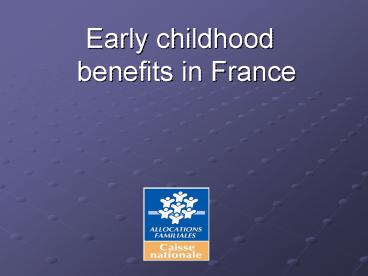Early childhood benefits in France
1 / 17
Title:
Early childhood benefits in France
Description:
With a fertility rate of 1.98 something of an exception in Europe ... Prise en charge r mun ration. selon revenus/age enfant et 100%. Cotis. soc. AM,50% GD ... –
Number of Views:40
Avg rating:3.0/5.0
Title: Early childhood benefits in France
1
- Early childhood benefits in France
2
France and fertility
- With a fertility rate of 1.98 something of an
exception in Europe and unusual in the developed
world - France has attracted the curiosity of our
friends abroad - In France, "child costs" are offset by
increasingly high expenditure on family policy,
currently 3.8 of GDP (3rd among OECD countries) - Through a combination of local government
programmes, tax credits, old-age insurance
contributions and multiple benefits, France
devotes nearly 4.6 of its GDP to families - France is one of the EU countries that offers the
most generous childcare benefits for the
under-sixes
3
A comparison of fertility rates
4
A comprehensive range of benefits for parents
raising children
- Actors family branch of the social security
system (60 of all benefit provision),
health/maternity/old-age insurance system, local
government - Tax measures
- Measures to balance work and family life
- High school-attendance rate
5
Pregnancy confirmed
Income ceilings
PAJE birth grant 863 (means-tested benefit
paid in 7th month of pregnancy)
Support Sickness and maternity benefits
Baby born
Congé mère (16 sem), père (11 j)
garanties Dispositions conventionnelles
Retour à lemploi
Retrait activité
PAJE
Partly
Garde à domicile
Crêche , Subventions fonctionnement CAF et
Collectivités locales
Completely
135 to 407
1 year 766
Assistantes maternelles
3 years 536
Autres modes 177
Prise en charge rémunération selon revenus/age
enfant et 100 Cotis. soc. AM,50 GD
AVPF droits vieillesse
6
Contributions to childcare costs
7
Who looks after the under-threes?
2
8
Who looks after the under- threes?
In families where both parents work full-time
9
About the PAJE
- Principles...
- An "all-in-one" benefit
- and a simplied benefit system
- A more equal distribution of the cost burden of
childcare - Expenditure to income ratio 12 target
- Greater financial security for families
- More choice for families
10
About the PAJE
- and policies
- An "all-in-one" benefit rather than a "single"
benefit - Extension of the basic allowance
- Creation of a 6-month parental leave benefit for
one-child families - For parents paying a childminder
- Larger share of cost covered by family fund
- Simplification of procedures
11
Parental leave in OECD countries
12
Those countries with high female employment rates
are those with the highest fertility rates!!!
A need to recognise that women want to
combine working and having children! Ideal
number in France 2.48
13
(No Transcript)
14
Old-age insurance for parents who have stayed at
home to bring up children
- Coverage of contributions for old-age insurance
- 4.2 billion in 2006
- 8 of expenditure by the CNAF
- 1.6 million recipients
15
Paternity leave
- 11-day paternity leave introduced in 2002
- For unpaid leave, same daily cash benefits as for
mothers - CNAF payments in 2006 248.5 million (up 8.2
from previous year)
16
Equality and agreement-based initiatives
- Collective agreements ensuring the right of
parents to return to the same job after parental
leave - Measures to encourage sharing of parental
responsibilities - Developed-country initiatives to promote
workplace gender equality - Companies need to do more to accommodate the
needs of working mothers
17
Family policy and fertility
- French family policy is not "pro-birth". It
simply aims to accommodate the desire of women to
combine work and child rearing - The traditional explanations for fertility rates
- Bigger families in northern France versus smaller
families in the "Malthusian" south - Bigger families among working classes
- Religious practices (less than 5).
- are less valid today
- So early childhood policies are important
- As well as choice for parents































